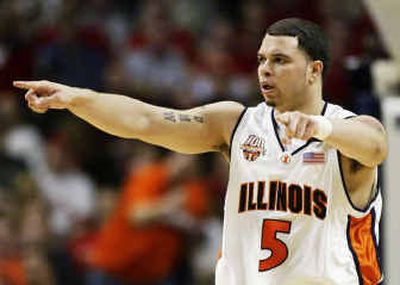No lost cause

The challenge has changed for Illinois. There is no more talk of the 1976 Indiana team, the last to go undefeated and win the NCAA championship. The top-ranked Illini are a one-loss team, having fallen to Ohio State in the regular-season finale before winning the Big Ten tournament title Sunday. This might not be a meaningful statistic, but it is factual: No once-beaten team has won the NCAA Tournament in 30 years, since North Carolina State did it in 1974.
Stanford and Saint Joseph’s tried and failed last season, after their long undefeated streaks had ended shortly before the NCAA Tournament.
Saint Joseph’s was halted one step shy of the Final Four, losing to Oklahoma State in the final seconds.
But Stanford – a team that, like No. 1 Illinois, lost in the final game of the regular season, then played three wearying games to win its conference tournament – became a second-round NCAA upset victim, falling to Alabama.
“It probably took its toll,” said Stanford assistant coach Eric Reveno, who remained on staff after Mike Montgomery left for the Golden State Warriors.
“We were probably more tired, having defended No. 1 and an undefeated record all year long.
“At the end, I wish we had lost a game early, if we were going to lose one.”
Similarities to Illinois? Who is to say?
“What they did isn’t us,” Illinois guard Luther Head said.
Certainly the Illini have a friendly road to the Final Four: bus rides to Indianapolis, Chicago and St. Louis.
But even though Dee Brown, Deron Williams and Head are still whipping around passes with stunning swiftness and striking efficiency in what amounts to a three-point-guard offense, there appear to be some cracks.
In the loss to Ohio State, on a Buckeyes 3-pointer with 5 seconds left, Illinois shot only 38 percent, far less than its 50 percent season average at the time, and had an uncharacteristic seven second-half turnovers.
Against Northwestern in the Big Ten quarterfinals, the Illini shot better but had 16 turnovers.
Against Minnesota in the semifinals, the Illini had a season-high 23 turnovers and shot 36 percent.
Against Wisconsin in the final, Illinois shot 36 percent and scored a season-low 54 points, and Brown was held scoreless for the only time this season, going 0 for 8, including 0 for 5 from 3-point range.
“It’s hard to play three games in a row,” coach Bruce Weber said. “It definitely makes a difference in your shooting.”
Yet it is clear there is concern about Brown.
He made 8 of 10 3-point shots against Purdue on March 3, concluding a stretch during which he made 50 of 80 shots, and shot 60 percent from 3-point range.
Since then, he is 7 for 35 from the field and 5 for 23 from 3-point range.
“I do not think that he’s been in a big slump like this for a long time,” Weber said. “Maybe if he gets back into the gym a little bit, it may cure a lot and give him some confidence.
“He had some problem with his teeth. He had a toothache before the Ohio State game. He is still having some problems, so hopefully we can address that.”
Brown scoffs at the idea that his teeth are hurting his shooting touch.
“I just didn’t hit no shots,” he said. “Playing hard, that’s all I’m about.”
Head figures the Illini, a team Minnesota coach Dan Monson calls “as unselfish offensively as any college team I’ve seen,” can weather one player’s shooting slump.
“Who cares about that?” Head said. “We’re a defensive team. … Winning games and defending well are what we all care about.”
The Illini have reason to be tired, physically and emotionally, after the end of their unbeaten streak and the loss of Weber’s mother, who died last Friday after suffering chest pains as she picked up her tickets for the Big Ten tournament.
Weber coached on, and he and his family made funeral arrangements to accommodate the Illini’s schedule, as well as that of his younger brother David’s Chicago-area high school team.
Weber won’t be the first coach to guide his team through the NCAA Tournament while in mourning.
In 2000, North Carolina won a regional title only days after the death of coach Bill Guthridge’s mother. Guthridge then attended his mother’s funeral the Monday before taking his team to the Final Four.
Weber seems composed, despite his family’s loss.
His Illini are ready to try to do something so many teams have been unable to do since N.C. State avenged its only loss to UCLA in 1974. (Among them were Nevada Las Vegas in 1987, Temple in 1988, Kansas in 1997 and Duke in 1999.)
Weber wants nothing more than for his team and his brother’s to keep playing, with their mother never far from their minds.
“This is what she would have wanted,” he said. “And she’d be so proud if he can get to state and we can make a run in the NCAA Tournament.”